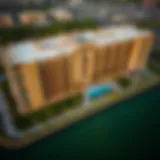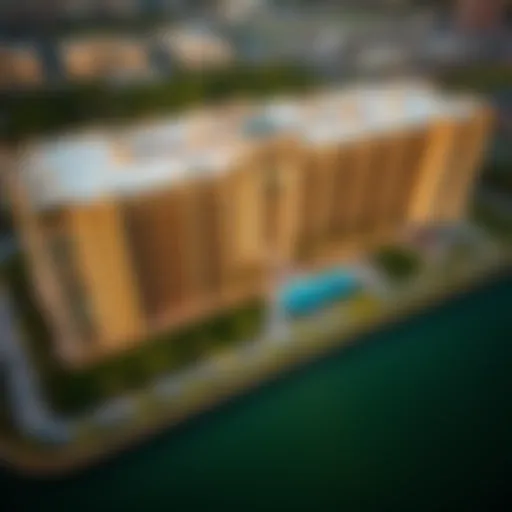Exploring Dubai's Urban Real Estate Development


Intro
Dubai’s skyline is a testament to its rapid urbanization and real estate dynamism. The evolution of its urban landscape has been nothing short of remarkable. The shifts in property market dynamics not only reflect economic currents but also influence everyday life for its residents. Understanding this complexity is essential for anyone looking to navigate the bustling Dubai real estate scene.
As we journey through this analysis, we will unearth the layered dimensions of consolidated urban real estate development in Dubai. This article is structured to provide an in-depth look at current market trends, investment opportunities, and the socio-economic factors that mold the market. With every turn, we aim to present a detailed narrative that explores the intricacies of Dubai’s urban development.
From government policies to sustainability efforts, each element plays a crucial role in shaping the market. Whether you’re an investor, a buyer or a developer, it’s vital to grasp these trends to make informed decisions.
For the discerning reader, this exploration into Dubai’s property landscape will not only unveil pertinent insights but also enhance your ability to perceive opportunities hidden within the vibrant urban tapestry. Let's take a deeper look into the property market analysis.
Understanding Consolidated Urban Real Estate Development
Consolidated urban real estate development plays a pivotal role in shaping the urban fabric of cities, particularly in burgeoning markets like Dubai. The process involves the integration of land, resources, and infrastructure into cohesive developments that not only meet current needs but also anticipate future growth. Understanding this topic is essential for stakeholders ranging from investors and buyers to real estate agents and developers, as it directly impacts decision-making in a highly dynamic market.
Definition and Key Characteristics
Consolidated urban real estate development can be defined as the strategic coordination of multiple real estate projects within a geographic area to create a synchronized urban environment. Key characteristics of this type of development include:
- Mixed-Use Development: Often, consolidated projects blend residential, commercial, and leisure spaces into single developments. This creates more vibrant communities where people can live, work, and play all in one spot.
- Sustainability Initiatives: Increasingly, there is an emphasis on environmentally sustainable practices, including energy-efficient building designs and green spaces that enhance residents' quality of life.
- Strategic Planning: Thorough urban planning is at the heart of consolidation. It ensures that the development meets zoning regulations and addresses community needs such as schools, parks, and public transportation.
- Partnerships: Developers often work alongside government entities and private companies to share resources, knowledge, and technologies, facilitating smoother and more effective development processes.
By embracing these characteristics, consolidated urban development not only holds economic benefits but also fosters a sense of community and identity among residents.
Historical Context in Dubai
Dubai's journey into consolidated urban real estate development has been remarkable. From a modest trading hub, it has transformed into a glittering metropolis, showcasing architectural marvels and sprawling residential complexes. The city's historical context provides vital insights into this transformation.
In the late 20th century, Dubai began embracing a vision of rapid development, driven by government initiatives aimed at diversifying the economy away from oil dependency. The establishment of entities like the Dubai Land Department enabled regulatory frameworks that promoted real estate investment. Important milestones include:
- The launch of freehold property in 2002, which allowed non-nationals to own property, spurring a significant influx of foreign investment.
- The Dubai Marina, developed in the early 2000s, showcasing a blend of luxury and innovation, is one of the prime examples of how consolidated projects have redefined Dubai’s skyline.
- In recent years, notable infrastructure projects such as the Dubai Expo 2020, have highlighted the importance of cohesive urban planning in attracting global attention and visitors.
This historical backdrop underscores the necessity for understanding consolidated urban development. It highlights how long-term vision and strategic collaborations have paved the way for Dubai to thrive as a global player in the real estate market.
"Dubai's approach to urban development exemplifies how a clear vision can turn a city's dreams into reality."
In closing, grasping the essentials of consolidated urban real estate is not just an academic exercise; it's a critical approach for anyone wanting to navigate the complexities and opportunities within Dubai's evolving landscape. Investors, buyers, and developers alike can benefit immensely from understanding these dynamics.
The Role of Government Policies in Real Estate Development
Government policies heavily influence the real estate landscape, particularly in a rapidly growing market like Dubai. This section delves into the regulatory frameworks that shape development, as well as the incentives put in place by local authorities to attract both domestic and international investors. Understanding these dynamics is crucial for any stakeholder aiming to navigate the future of real estate investments in the region. The policies enacted can lead to a favorable business environment, thus spurring growth and innovation within the sector.
Regulatory Framework and Impact
The regulatory framework governing real estate development in Dubai is structured to create a balanced ecosystem conducive to both investment and sustainable expansion. The Dubai Land Department plays a pivotal role in ensuring transparency and protecting investors. Recent initiatives led by the government have emphasized the importance of robust legal systems, which in turn fosters confidence among stakeholders.
- Property Ownership Laws: Foreign ownership of property is facilitated through legislation allowing 100% ownership in designated areas, which has significantly broadened the market for international buyers.
- Zoning Regulations: These laws dictate what can be built where, enforcing standards meant to enhance urban planning and community well-being. Zoning regulations ensure that developments align with the city’s long-term vision, such as the Dubai Urban Master Plan 2040.
- Quality Control: Regulations also enforce quality standards for construction, thus protecting clients from inferior workmanship. This is vital for maintaining the reputation of Dubai as a premium real estate destination.
Such robust regulatory frameworks encourage not only local developers but also global investors looking to establish a foothold in Dubai. However, as markets evolve, the need for periodic reviews and updates to these regulations becomes essential to respond to changing market dynamics and technological advancements.
"A strong regulatory framework is the backbone of a thriving real estate market, providing safety and assurance to investors."
Incentives for Investors
To further entice investment, the Dubai government has rolled out a series of incentives aimed at stimulating the real estate sector. These initiatives are particularly attractive for international stakeholders and are designed to ensure quick returns on investment while revitalizing the local economy.
- Tax Breaks: One of the most notable incentives is the absence of property taxes for both residential and commercial properties. This lack of tax burden is a key selling point for many investors.
- Freezone Developments: Areas such as the Dubai Multi Commodities Centre (DMCC) allow for further investment incentives, including no personal income tax and full ownership. Such special economic zones are strategically significant for investors focused on global trade.
- Financing Options: The government has facilitated access to financing through partnerships with banks, allowing developers to engage in projects that might have been financially unfeasible otherwise.
- Streamlined Processes: Additionally, initiatives to simplify and speed up the approval processes for permits can make a considerable difference. Quick turnaround times can make a project viable and appealing to investors who are focused on time-sensitive returns.


These incentives are instrumental in positioning Dubai as a global hub for real estate investment. By fostering a welcoming environment for developers and investors alike, the government is not just promoting construction; they are building a future that benefits the economy and society as a whole.
Market Dynamics of Urban Real Estate in Dubai
Understanding the market dynamics of urban real estate in Dubai is crucial for anyone involved in this space. The interplay of various factors influences investment strategies, property values, and ultimately, the city’s broader economic landscape. Knowing these dynamics helps investors and stakeholders make educated decisions and adapt to shifting trends efficiently. In a city famed for its rapid growth and ambition, staying ahead in the real estate game holds significant benefits.
Recent Trends and Data Analysis
Dubai's real estate market has seen remarkable fluctuations influenced by global economic conditions, demographic shifts, and evolving consumer preferences. Recent data reveals a tantalizing mix of opportunity and caution. For instance, according to data from the Dubai Land Department, transactions in the real estate sector have been steadily increasing. In 2022, property sales reached levels not seen since 2014, with a surge in off-plan sales driven by local and foreign investors keen on securing prime properties.
Some noteworthy trends include:
- Increased interest in luxury and niche markets: High-net-worth individuals are seeking exclusive residential offerings, such as penthouses in Downtown Dubai or villas on the Palm Jumeirah.
- Rise of remote work accommodations: As work-from-home seems to be a lasting trend, there's a noticeable demand for residences that offer more space and amenities suited for remote professionals.
- Technological integration in real estate: The adoption of smart home technologies is influencing buyer decisions. Properties equipped with state-of-the-art amenities often see a quicker turnover rate.
Moreover, demographic dynamics are shifting, with a growing expatriate community contributing to varied demands in housing styles and functionalities. All these trends underscore the adaptive nature of Dubai's market, allowing it to recover swiftly post-economic fluctuations.
Demand and Supply Considerations
The supply-demand equation in Dubai’s real estate market is a tapestry woven from various threads, reflecting both opportunities and challenges.
On one hand, the rise in demand signals a thriving economy, with factors such as:
- Population growth: Increased migration into Dubai fuels demand across different property types, especially in urban areas which are accessible and well-connected.
- Infrastructural investments: Continuous advancements in infrastructure—like the Dubai Metro expansion—enhance property desirability and raise values in many neighborhoods.
On the other side, the supply aspect poses its own set of challenges:
- Saturation in certain segments: Certain areas, particularly those with a high concentration of luxury apartments, are experiencing oversupply, which may lead to downward pressure on prices.
- Regulatory constraints: Development approvals can take time, which may lead to a mismatch between planned supply and actual market demand.
"Understanding demand and supply in the real estate sector isn’t just about numbers; it's about grasping the very pulse of the market."
Architectural Innovations Shaping the Skyline
The architectural landscape of Dubai is nothing short of a visual feast. As the city expands and evolves, the innovations in architecture play a pivotal role in shaping not only the skyline, but also the cultural identity of this vibrant metropolis. These innovations are not simply aesthetic; they come with a baggage full of economic and environmental benefits, making them essential components for investors and developers seeking to make a mark in one of the world’s most dynamic real estate markets.
In Dubai, the synergy of art and engineering is often on full display. Innovative designs are transforming the city into a living tapestry, with each structure telling its own story. From high-rise towers that pierce the sky to sprawling complexes that blend seamlessly into their surroundings, architectural innovation here is both a competitive advantage and a necessity. These designs don’t just stand out visually; they also help communities thrive, encouraging social interaction and sustainability.
Iconic Projects in Development
Dubai is currently home to a slew of iconic projects that exemplify the cutting-edge architectural trends shaping its skyline. Noteworthy initiatives include:
- Burj Binghatti Jacob & Co. Residences: Set to be the tallest residential building in the world, this project promises opulence and unrivaled views, appealing to wealthy buyers seeking both luxury and investment potential.
- Dubai Creek Tower: Designed to surpass the Burj Khalifa, this structure will not only add to the skyline but also serve as a symbol of Dubai’s enduring ambition.
- The Museum of the Future: A unique structure reflecting innovation in design, this museum is poised to capture the imagination of visitors while also serving as a hub for technological advancements.
These projects serve as beacons of what’s possible when architecture meets visionary thinking. They attract attention and investment, further fueling Dubai's real estate ecosystem.
Sustainable Architecture and Green Building
As the world battles environmental issues, the importance of sustainable architecture cannot be overstated. In Dubai, initiatives aimed at achieving sustainability are gaining momentum. Green buildings are not merely a trend; they are essential for ensuring the city’s resilience against climate change.
A few key elements of sustainable architecture in Dubai include:
- Energy Efficiency: Many new developments are incorporating energy-efficient technologies such as smart grids and solar panels to reduce consumption.
- Water Management: Innovative systems for recycling and conserving water are being implemented to tackle the arid climate, ensuring that resources are not wasted.
- Use of Eco-Friendly Materials: Architects are increasingly opting for materials that have a lower environmental impact, thus fostering sustainability right from the ground up.
"The future of construction lies in creating spaces that respect our planet’s resources while offering comfort and luxury.”
With such considerations becoming standard in new projects, stakeholders—from investors to homebuyers—should keep a keen eye on how these aspects are woven into future developments. The architectural innovations reshaping Dubai's skyline not only reflect modernity but also set a high standard for sustainability in urban environments globally.
Socioeconomic Impacts of Urban Real Estate Consolidation


The interplay between urban real estate consolidation and the socioeconomic fabric of Dubai can't be understated. With the rapid growth of its skyline and deceptive coalescence of various sectors, the implications for local communities and the broader economy play a significant role in understanding Dubai's dynamic real estate sector. This section aims to explore the not just the immediate benefits, but also the long-term considerations that come with such consolidation.
Impact on Local Communities
One of the most direct effects of urban real estate consolidation in Dubai is its impact on local communities. As new developments crop up in previously barren areas, they instigate not just a physical transformation but also social changes.
In many instances, these developments promote a sense of community. Spaces designed with social interaction in mind—parks, community centers, and commercial hubs—enhance the quality of life for residents. Such thoughtfully constructed environments often foster bonds among diverse groups, breaking down the barriers introduced by rapid urbanization.
However, the impact is not solely positive. The influx of new residents and businesses can lead to gentrification, where original inhabitants may be pushed out as property values rise. This shift can jeopardize the cultural identity of neighborhoods that have long existed in their current forms. One might say, "the rising tide lifts all boats, but it can also capsize some." Local communities must navigate the balance between welcoming development and protecting their unique identities.
"New developments can create vibrant communities but can also erase the historical fabric of established neighborhoods."
Job Creation and Economic Growth
The consolidation of urban real estate does not just shape the physical landscape; it drives significant economic changes as well. Major construction projects and property developments serve as catalysts for job creation. Consider initiatives like the Dubai Creek Tower, which employ thousands, from engineers to laborers. This local engagement ensures that when construction ramps up, a ripple effect occurs across various sectors.
Moreover, the initiation of commercial spaces contributes to sustained economic growth. Retail hubs attract tourism, while office spaces draw in multinational corporations, which further increases demand for local services, from restaurants to maintenance providers. A newly developed area can quickly morph into an economic powerhouse.
However, with increased job opportunities comes the need for a skilled workforce. Investors and developers must also be cognizant of the training programs required to equip residents with the skills needed for these emerging jobs. Neglecting this aspect may lead to a mismatch between available jobs and workforce qualifications.
Investment Opportunities in Dubai's Real Estate
In the heart of the Middle East, Dubai stands as a beacon for investors eyeing fresh opportunities in the real estate sector. The city's swift modern development and its global business hub status make it a hotbed for property investments. Analyzing the landscape here reveals not just potential financial gains, but also a diverse range of investment avenues that cater to various interests and capital capacities.
Investing in real estate in Dubai is not merely about acquiring land or property; it involves tapping into a thriving market that is on the cusp of continuous growth and innovation. The pace of development is staggering, and the various government incentives aimed at foreign investors only add fuel to the fire.
Among the myriad benefits, the tax-free environment stands out. Dubai offers a conducive climate with zero property tax, making it immensely attractive for both local and international buyers. The lack of capital gains tax further sweetens the deal, ensuring investors retain a larger slice of their profits. Moreover, rental yields in Dubai frequently surpass those in other cities around the world, enticing those seeking robust returns on their investments.
Yet, it’s not a free-for-all. Investors must remain vigilant about market trends and fluctuations, knowing fully well the nuances of property laws and regulations. For those willing to dive deeper, the rewards can be significant. Let's explore in detail the current hotspots and potential risks, along with strategies to navigate them.
Hotspots for Property Investment
Dubai is a city where diverse property options reside side by side, catering to varying tastes and financial capabilities. Some neighborhoods stand out more than others as prime contenders for investment.
- Dubai Marina: This waterfront community is not only stunning but also continuously draws a crowd. With its luxurious high-rises and vibrant nightlife, it remains a favorite among expats and tourists alike.
- Downtown Dubai: Known globally for landmarks like the Burj Khalifa and Dubai Mall, this area attracts high yields due to its tourist traffic and premium amenities. It offers a mix of residential and commercial properties.
- Jumeirah Village Circle (JVC): This suburban community appeals to a wide demographic, including families. Offering affordable villas and townhouses, JVC has become a favorable option for long-term investors seeking reasonable returns.
- Palm Jumeirah: Known for luxurious beachside living, investing here is often seen as a status symbol. High-net-worth individuals are drawn to this icon, maintaining strong demand for properties.
- Dubai Silicon Oasis: For those looking to tap into the tech sector, this area is emerging as a tech hub featuring residential as well as commercial options.
Selecting the right location can significantly influence potential returns and capital appreciation. Each area has its character, and buyers must match their investment strategy with the property's market position.
Investment Risks and Mitigation Strategies
Like any investment, putting money into real estate in Dubai comes with its share of risks. The market's volatility, local regulatory changes, and the pace of development can lead to unpredictable outcomes. However, understanding these risks is half the battle; managing them is the other. Here are some common risks and strategies to mitigate them:
Market Fluctuation: Property prices can be cyclical. Keeping an eye on market trends, using data analytics, and getting advice from experts can help investors make informed decisions when to buy or sell.
Regulatory Changes: Laws governing real estate can change, impacting ownership rights and taxes. Staying updated on regulations, perhaps through government websites or industry associations, can allow investors to adjust strategies proactively.
Overdevelopment Risks: In some areas, an abundance of properties can saturate the market. Conducting thorough market research helps anticipate whether an area will sustain long-term growth or face oversupply issues.
Legal Complications: Sometimes, property transactions might be mired in red tape. Hiring reliable legal advisors familiar with Dubai’s property laws ensures that potential legal pitfalls are avoided.
Economic Downturns: Global or local economic downturns can affect rental demand. Diversifying investments across various sectors and geographical locations can provide a buffer against economic shocks.
By being aware of the various risks and employing sound strategies to manage them, investors in Dubai's real estate market can navigate these waters more effectively, potentially reaping significant rewards.
"Investing in Dubai’s real estate isn’t just about owning a piece of property; it’s about becoming part of a growing, dynamic city that continues to evolve and innovate."
As investors consider their next steps, the potential in Dubai remains palpable. With robust planning and strategic insights, the opportunities are ripe for those ready to make their mark.


Future Outlook for Urban Development in Dubai
The future of urban development in Dubai stands as a testament to the city’s ambition and adaptability. As a rapidly evolving market, the focus shifts towards innovation, sustainability, and integration of advanced technology in real estate. The importance of examining this future landscape cannot be overstated, as it lays down the groundwork for potential investment opportunities, informs policy-making, and shapes community growth.
Real estate in Dubai holds immense significance not only for its economic contributions but also for the interwoven fabric of cultural dynamics and the way it influences everyday living. As stakeholders navigate the complexities of a changing market, understanding the trends and potential trajectories becomes essential for informed decision-making.
Emerging Trends to Watch
In the realm of urban development, a few trends begin to surface that are likely to shape Dubai’s horizon in the coming years:
- Smart Cities: The integration of Internet of Things (IoT) technology is set to redefine urban living. Developers are incorporating smart solutions that enhance convenience and efficiency, from energy management to transportation systems.
- Sustainable Development: There's a growing emphasis on eco-friendly building methods. With Dubai's harsh climate, innovations in sustainable architecture that tackle energy consumption are becoming crucial. Expect projects that use solar power or green roofs to be the norm rather than the exception.
- Mixed-Use Developments: The trend towards mixed-use properties is gaining traction. Developers are combining residential, commercial, and recreational spaces into single complexes, creating vibrant communities that promote work-life balance.
- Digital Transformation in Transactions: The necessity for efficiency has prompted a shift towards digital platforms for transactions. Virtual tours, online consultations and blockchain for property transactions are making waves.
The implications of these trends are far-reaching, promising a future where urban development is not only about constructing buildings but also about enhancing the quality of life.
Predicted Changes in Market Dynamics
As the market landscape in Dubai continues to evolve, several changes in market dynamics can be anticipated:
- Increased Competition: With more players entering the market, competition will intensify. Investors and developers will need to differentiate their offerings through innovation and added value to attract buyers, and this may drive down prices for rentals and purchases in the short term.
- Evolving Buyer Preferences: As demands shift, there is likely to be a gradual move toward properties that offer more value in terms of amenities and sustainability. Buyers today are less interested in mere square footage and more in quality of life enhancements.
- Impact of Global Events: Political and economic changes worldwide will influence the real estate market in Dubai. Fluctuations in oil prices, global market volatility, or even changes in immigration policies can have significant repercussions on demand.
- Emergence of Niche Markets: As more foreigners look to Dubai as a new home, niche markets tailored to various demographics will sprout. Luxury villas or affordable housing for expatriates could see a rise in demand depending on target audiences.
"Understanding the pulse of the market is essential. Anticipating shifts based on macroeconomic indicators and local trends will serve as a guiding star for investors."
Challenges Facing the Consolidated Urban Real Estate Sector
The urban real estate market in Dubai is a bustling hub teeming with opportunities. Yet, beneath the glimmering skyscrapers and luxury properties, some stark challenges lie in wait. Understanding these challenges is crucial for investors, buyers, real estate agents, brokers, and developers. They influence not just decision-making but also the long-term viability of investments in this vibrant market.
Market Saturation and Overdevelopment
In recent years, Dubai's real estate sector has witnessed an unprecedented boom. The ambition to create a sprawling urban landscape has led to a surge in construction projects. Yet, this rapid expansion has sparked concerns about market saturation.
The problem? An increased number of high-end properties has flooded the market, leading to an oversupply that outstrips the demand. The result is a potential drop in property values and rental yields. Investors might find themselves in a position where their assets are worth less than initial projections.
This saturation can also hinder the development of new projects. Developers might be unwilling to take risks in such an oversaturated landscape, which stifles innovation and the creation of unique properties. It’s crucial for stakeholders to conduct rigorous market analysis before diving into new investments. Understanding demographic trends and consumer preferences can provide valuable insights.
Environmental and Sustainability Concerns
As we edge deeper into the era of climate awareness, environmental concerns have become a dominant issue for urban real estate development. Dubai's ambitious projects often heavily impact its relatively delicate desert ecosystem. Expanding urban areas require vast resources, from water to electricity, promoting environmental footprints that may not be sustainable in the long run.
Furthermore, the emphasis on luxury and status can lead to overlooking green building practices. Properties designed with little regard for ecological considerations may not hold long-term value. Investors and developers should prioritize sustainable practices that minimize environmental impact. This includes using eco-friendly materials, implementing renewable energy sources, and considering biodiversity in urban planning.
The Global Reporting Initiative and the Dubai Clean Energy Strategy 2050 are advocating for greener development methods that align with these sustainability goals. Stakeholders who embrace these initiatives may find themselves ahead of the curve, appealing to a growing demographic that values ecological responsibility.
Sustainable practices in real estate not only preserve the environment but can lead to better financial returns due to growing consumer demand for green buildings.
Ending: Synthesizing Insights on Urban Real Estate Development
In the ever-evolving landscape of urban real estate, the importance of consolidating efforts and insights cannot be overstated. As Dubai acts as a beacon of growth and innovation, understanding the nuances of its real estate sector proves crucial for a diverse range of stakeholders. The complexities of this market—ranging from government policies to architectural wonders—highlight a need for comprehensive analysis and proactive engagement.
Real estate, being a barometer for economic health, serves as a powerful tool to gauge the broader market trends. Investors looking to penetrate this market stand to benefit from recognizing the patterns that emerge from previous developments and ongoing strategies. Meanwhile, real estate agents and brokers must remain aware of the shifts in demand and supply, which dictate pricing and potential investment returns. For developers, focusing on sustainability and community impact not only resonates with current market trends but also ensures relevance in future growth.
Overall, this synthesis reflects the importance of informed decision-making in a market prone to rapid change. The intersection of insights into policy, investment opportunities, and socioeconomic impact creates a fertile ground for opportunity in Dubai's real estate realm.
Key Takeaways for Stakeholders
- Stay Informed: Keeping abreast of government regulations and emerging trends can significantly enhance strategic positioning.
- Embrace Sustainability: Investment in green buildings and sustainable practices not only aligns with market demands but also attracts environmentally conscious buyers.
- Leverage Data Analytics: Utilizing market analytics to understand demand and supply dynamics can inform better investment choices and property valuations.
- Focus on Community: Developing projects that benefit local communities often enhances long-term value for investors and developers alike.
Final Thoughts on Dubai's Future
Dubai's future in the realm of urban real estate development promises to be both exciting and challenging. The city's ability to adapt to global economic conditions and local demand patterns will dictate the trajectory of future projects. With ambitious plans on the horizon, the relentless pursuit of innovation in urban planning and architecture will continue to shape Dubai's skyline.
The city holds a unique position contingent upon international relations and investment flows, making it necessary for stakeholders to remain astutely aware of geopolitical influences. As the urban landscape morphs with the tide of technology and environmental considerations, Dubai's real estate market is set to remain a compelling arena for investors, buyers, and developers.
Ultimately, understanding the intricate dance between urban development, policy changes, and market dynamics will equip stakeholders with the critical insight required to navigate this remarkably vibrant market. For investing in Dubai's real estate, the key is not merely to observe but to engage, adapt, and thrive amidst the rapid transformation.











